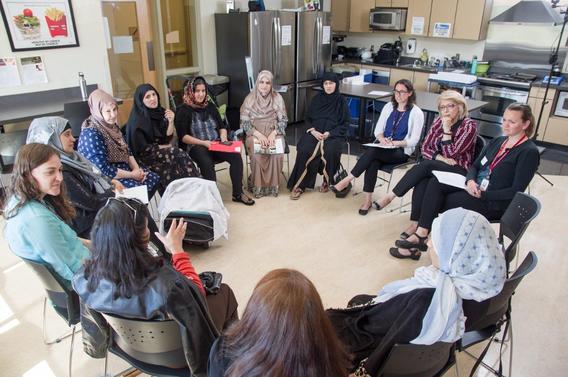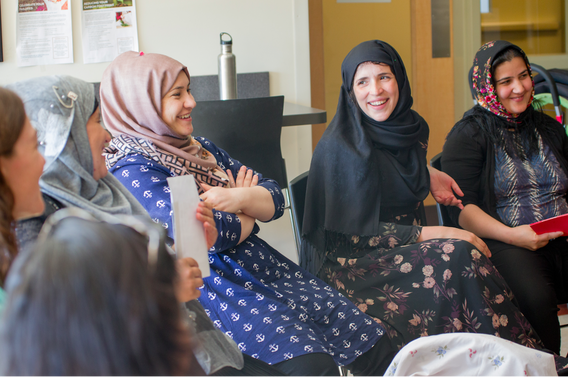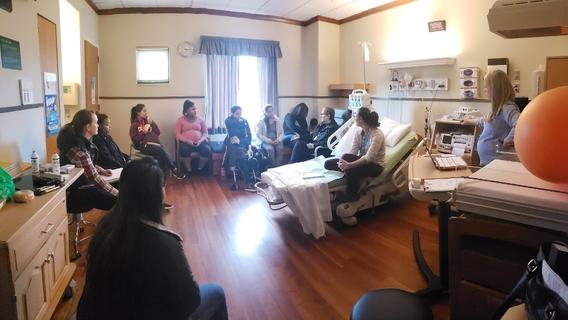More than 75,000 of the Afghans who were displaced as the Taliban took control of Kabul have found refuge in the United States through Operation Allies Welcome (OAW) Response. Established in 2021, OAW coordinated efforts among multiple federal, state, and local agencies to resettle and support Afghan newcomers. As the COVID-19 pandemic continued to unfold, Afghans arrived in the United States and resettlement agencies nationwide had to quickly work together with federal partners, healthcare systems, and public health departments, as well as social service and community-based organizations, to deliver much-needed support.
Recently resettled Afghans are adapting to their new lives, contributing meaningfully to their communities, accessing public benefits, and exploring opportunities for children and adults in their families. At the same time, they face hardships related to sudden displacement and navigating complex systems, like the U.S. healthcare system, as English language learners.
For resettled expecting mothers, navigating this unfamiliar health care system presents specific challenges. They may encounter linguistic and cultural barriers to information and services, which may affect the quality of care they receive and increase the risk of complications during pregnancy.
Preventive Care and Support for Expecting Afghan Mothers
Compared with expecting mothers in the United States who were not displaced, expecting mothers who recently resettled from Afghanistan may face a greater risk of developing complications during pregnancy because of factors like the following:
- Limited availability of appropriate healthcare, including prenatal care, during displacement and transit
- Insufficient food and/or clean water during displacement and transit
- Possible exposure to prevalent communicable diseases (e.g., tuberculosis) in their place of origin or places of transit
- Prevalence of non-communicable diseases (e.g., diabetes)
- Reduced use of healthcare services after resettlement due to lack of familiarity, lack of gender congruent providers, concerns about cost, fear, or distrust
- Barriers to accessing healthcare after resettlement, including language options for scheduling an appointment, health insurance requirements, and transportation to healthcare settings
- Misunderstandings about how and when to access emergency care services
- Differences in perspectives on hospital vs. home births
- Miscommunication between providers and patients due to language barriers, unavailability of interpreters, technological barriers, or other practical issues
- Miscommunication between providers and patients due to misunderstood cultural beliefs and practices around pregnancy and birth
- Loss of family support networks due to forced displacement
Preventive care and support—in the form of prenatal care, education, support groups, and other interventions—are vital to promoting healthy pregnancies and births for expecting Afghan mothers. Despite the risk factors above, most pregnant newcomers and their babies thrive. In order to ensure this, it is important for providers, nurses, birth educators, and other health workers to support the many strengths of pregnant women, devote special attention to improving access, develop bilateral trust, provide gender concordant care when feasible, honor their lived experience, community knowledge and expertise, and deliver linguistically and culturally concordant care.
Delivering holistic and comprehensive health services to Afghan women through patient-centered group prenatal care

HealthPoint, is a network of non-profit community-based health centers in Washington state that provide care to many communities, including newcomers from Afghanistan. One particular program that has led to positive health outcomes is the CenteringPregnancy model for prenatal care. This evidence-based model of group prenatal care, utilized across the country, has shown to decrease health disparities1; it consists of 10 facilitated two hour group prenatal visits with groups of 8-15 pregnant participants. Specifically, in an initiative first led by Dr. Shoshana Aleinikoff, Dr. Jessica Karp and Xiomara Pocasangre, CenteringPregnancy groups were held in the language Dari prior to the Operation Allies Welcome (OAW) response. As a result, not only did participants stay engaged in the program but children of participants also had higher rates of immunization and well-child checkups. Currently, this model is the default care model for pregnant people at HealthPoint.

The team implementing this model have adapted the curriculum to be more culturally appropriate for the participants and the majority of the cohorts are currently run in Dari. CenteringPregnancy honors the importance of this work and now offers health communications resources including a printed patient notebook and video in Dari. At HealthPoint, facilitators also encourage and empower pregnant participants to teach each other, which then organically ensures the conversations and curriculum are more culturally relevant. Although some participants have already given birth and can share their knowledge and experiences to others, not all pregnant people involved have delivered in the United States. Specifically, some individuals have had traumatic delivery experiences in hospitals in Afghanistan and have anxiety around what the experience may be like in the United States. As requested by group participants, these anxieties are now addressed during the prenatal program through either in-person or virtual tours of the hospital, in order to help alleviate concerns and answer questions.

This program not only provides health education, but also social connection for Afghan newcomers adjusting to life in the United States. By tying in medical care, this model also provides a cultural justification for Afghan women to leave and take private time away from the family. The CenteringPregnancy model for prenatal care, especially when tailored for Afghan refugees, can address critical health needs around health education, navigating new health systems, and community connection for recent arrivals.
Prenatal Care and Orientation for Afghan Newcomers in California
The Refugee Health Assessment Program (RHAP) at County of Santa Clara Health System provides healthcare services to refugees, asylees, humanitarian parolees, Special Immigrant Visa (SIV) holders, and victims of human trafficking. An important part of the RHAP’s OAW response has been screening Afghan newcomers and connecting them to appropriate obstetric and pediatric care.
Mylene Madrid, RHAP Coordinator, notes, “One of the big changes that I’ve noticed is a lot of the clients have had many children already. They’ve given birth to many children and those were home births or never in a hospital.” Since visiting a hospital during the COVID-19 pandemic was intimidating and logistically challenging for these clients, the RHAP shared a video tour of the labor and delivery unit at Santa Clara Valley Medical Center with Dari- and Pashto-speaking case managers, who then showed it to clients to help them gain familiarity with the unit and understand more about what to expect in a hospital birth. The case manager’s intervention was part of a coordinated effort that also included teaching by clinic nurses and providers.
RAHP staff, nurses, providers, and expecting Afghan mothers have all needed to adjust their expectations around care and communication during pregnancy and birth. Mylene Madrid explains, “[Hospital birth] just wasn’t part of the standard practice back home. You relied on people that could help you do home births. So when we say, ‘You’re 38 weeks pregnant, you should come to the hospital and get checked out, because you have not had prenatal care here,’ they’re like ‘Hmmm, it’s my eighth child, I think I’ve got this’… They’re not opposed to going, but the feeling of urgency is different.” The RHAP has responded to these challenges by maintaining consistent messaging while demonstrating patience, respect, and cultural sensitivity in their communication with expecting Afghan mothers and their families.
